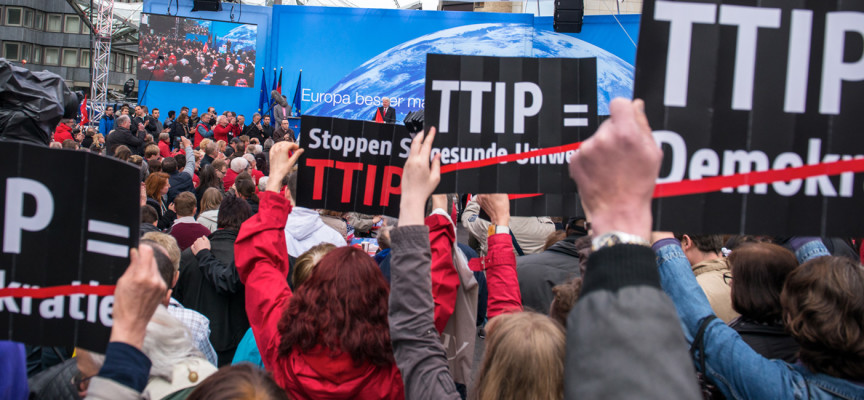Although the TTIP is an agreement being negotiated primarily at European level, its consequences will also be felt at national level. The same is true for CETA (Comprehensive Economic Trade Agreement) between Canada and the EU. What are the most significant bones of contention?
Defenders of TTIP refer to three key arguments. First, they claim that this kind of agreement enables more growth and thus greater prosperity, although all its forecasts (for example those which predict 2% more growth and 17% more trade) are extremely uncertain. What is not being addressed here is the extent to which poorer countries and ethnic groups stand to profit from TTIP. Second, TTIP supporters argue that doing away with non-tariff trade barriers (such as technical standards) will ease trade. However, there are concerns that this could lead to the dismantling of social and environmental norms (like the precautionary principle, a core ILO standard). Third, they argue that people should also consider the geostrategic objective of establishing standards for future world trade agreements, thus bolstering the western economic bloc and gaining a head start over the Chinese, for example.
Critical questions
TTIP affects the fundamental values and standards which underpin the European Union. Criticism of TTIP takes many forms, so we can only outline a few of them here. Negotiations are being conducted mostly behind closed doors and lack a great deal of transparency. Moreover, it is unclear how far the European Parliament and the national parliaments will need to agree with them. All of this contradicts the principle of proximity to citizens, and that could further aggravate the current European crisis.
In the opinions of many experts, TTIP undermines existing sovereignty. The proposed protection of investors contains clauses which allow companies to claim damages and place other obligations on Member States in arbitration tribunals exterior to their existing legal systems. There is no need for this, given that all Member States involved have well-established legal systems which offer perfectly adequate protection to investors. On international level, the dispute settlement procedure has proved itself to be reliable within the framework of the WTO and has led to behaviour which complies with the terms of the contract.
What is totally unacceptable is the planned ‘Regulatory Cooperation Body’ (RCB), let alone the other expert committees which will be continually updating the ratified agreement without parliamentary consensus. The RCB will even be consulted at the early stages of national legislative processes.
Social and ecological criteria
Under no circumstances may a liberalisation of trade through TTIP be allowed to weaken the social market economy across wide stretches of Europe. But this is exactly what would happen if powerful companies were to stand outside national jurisdictions. No one can deny that governments have sometimes failed, but, equally, one can point to just as many market failures. Especially problematic are the so-called ‘negative lists’ which specify that all sectors can be liberalised unless they are explicitly listed. A better approach would be to provide a positive catalogue explicitly listing the areas in which such liberalisation openings are advocated.
The EU promotes growth that is environmentally-friendly (green). Yet this aspect hardly ever comes up in the negotiations. It would therefore seem fitting to look in greater detail at the implications of increased trade, especially its impact on climate change, since more transport will generally lead to higher emissions pollution. Not only that, it will promote a lifestyle which revolves around consumption. What is at stake here is the coherence of the various EU policy fields; it also affects the sustainable development goals (SDGs) to which the United Nations and the EU signed up in 2015.
Where does this leave the poorer countries?
For a long time, the EU has given particular support to the poorest countries of the global south (ACP), and this is now incorporated into the framework of the WTO. However, trade agreements being brokered between powerful economic blocs are undermining these joint framework conditions. Most third countries will end up worse off through the effects of diverting trade, an anticipated by-product of TTIP, which means that poorer countries will be the very nations that will see their market access decrease. If poor countries are shut out of such negotiations, this will also run counter to the principle of procedural justice.
It is still too early to make any final judgment. Whatever happens, we must keep a highly critical eye on how further negotiations unfold. This calls for the greatest possible level of transparency, without any time pressures, and also for the democratic involvement of parliaments and the inclusion of civil society.
(source: Europeinfos #195)
Il Ttip è un accordo negoziato in primo luogo a livello europeo, le cui conseguenze tuttavia ricadranno anche a livello nazionale. Lo stesso vale per il Ceta (Comprehensive Economic Trade Agreement), trattato commerciale tra il Canada e l’Unione europea. Quali sono i principali punti di contesa?
I difensori sostengono soprattutto tre elementi principali. Primo: un tale tipo di accordo permette una maggiore crescita e quindi un miglioramento nel benessere, sebbene tutte le previsioni (per esempio quella che indica un +2% di crescita e +17% di scambi) siano molto incerte. Rimane da capire in che misura i Paesi e le comunità più poveri ne beneficeranno. In secondo luogo, lo smantellamento delle barriere non tariffarie (ad esempio, le norme tecniche) faciliterà il commercio. Tuttavia, vi è la preoccupazione che questo porti a uno smantellamento degli standard sociali e ambientali (ad esempio il principio di precauzione, una norma fondamentale dell’Organizzazione internazionale del lavoro). Terzo: sarebbe necessario considerare anche l’obiettivo geostrategico, con la definizione di standard per i futuri accordi commerciali nel mondo e rafforzare il blocco economico occidentale, prima che lo facciano i cinesi.
Domande critiche
Il Ttip riguarda i valori e gli standard fondamentali dell’Ue. La critica al Ttip è molto complessa e può essere descritta qui solo in maniera succinta. I negoziati si svolgono per buona parte a porte chiuse e non sono in larga parte trasparenti. Non è chiaro fino a che punto il Parlamento europeo e i parlamenti nazionali dovranno dare la loro approvazione. Tutto questo contraddice il principio di prossimità ai cittadini, cosa che potrebbe esacerbare la crisi europea.
Secondo il parere di molti esperti, il Ttip mina lo stato di diritto esistente. Il Piano di protezione degli investitori comprende clausole che consentono alle aziende di rivendicare i danni e pongono altri obblighi agli Stati nel contesto di tribunali arbitrali, al di fuori dei sistemi giudiziari esistenti. Ciò non risponde a nessuna necessità, dal momento che tutti gli Stati partecipanti hanno sistemi giuridici consolidati che proteggono adeguatamente gli investitori. A livello internazionale, la procedura di risoluzione delle controversie nel quadro dell’Organizzazione mondiale del commercio si è dimostrata affidabile e ha portato a comportamenti conformi ai contratti.
Il progetto di “Consiglio di cooperazione” (Ccr), invece, è del tutto inaccettabile come lo sono altri comitati di esperti, che dovranno aggiornare costantemente l’accordo ratificato, senza l’approvazione del Parlamento. Il Ccr non dovrebbe addirittura essere sentito al primo stadio del processo legislativo nazionale.
Criteri sociali ed ecologici
La liberalizzazione del commercio da parte del Ttip non deve in alcun modo indebolire l’economia sociale di mercato in gran parte dell’Europa. Ma questo è ciò che accadrebbe se le grandi imprese transnazionali fossero situate al di fuori delle giurisdizioni nazionali. Il risultato sarebbe innegabile: il fallimento dello Stato, ma anche il fallimento del mercato. Particolarmente problematiche sono le cosiddette liste negative, che specificano come tutti i settori non esplicitamente elencati possano essere liberalizzati. Una soluzione migliore sarebbe un elenco positivo che specifichi esattamente in quali ambiti tali aperture sono desiderabili.
L’Ue difende una crescita rispettosa dell’ambiente (verde). Ma ciò non gioca praticamente alcun ruolo nei negoziati. Bisognerebbe quindi esaminare attentamente quali conseguenze un incremento del commercio avrebbe, in particolare, sui cambiamenti climatici, dal momento che, in generale, l’aumento di trasporti ingenera un aumento delle emissioni inquinanti. Inoltre, il commercio promuove uno stile di vita che ruota attorno ai consumi. Qui ne va della coerenza tra i diversi settori d’intervento all’interno dell’Ue e ha conseguenze anche sugli obiettivi di sviluppo sostenibile (Sdo), a cui le Nazioni Unite, ma anche l’Ue si sono impegnate nel 2015.
Che cosa succederà ai Paesi poveri?
Da molto tempo l’Ue sostiene i Paesi più poveri del Sud del mondo (Acp), cosa che ora avviene nel contesto dell’Organizzazione mondiale del commercio. Ma gli accordi commerciali contrattati tra potenti blocchi economici minano queste regolamentazioni comuni. La maggior parte dei Paesi terzi sarebbe molto svantaggiata dagli effetti del ri-orientamento del commercio, con una perdita di accesso al mercato per i Paesi poveri. L’esclusione dei Paesi poveri in tali negoziati è anche in contrasto con il principio di giustizia procedurale.
È troppo presto per dare un giudizio definitivo. Ma, in ogni caso, bisogna analizzare il proseguimento dei negoziati in modo molto critico. Ciò richiede massima trasparenza possibile, nessuna pressione di tempo, partecipazione democratica dei parlamenti e coinvolgimento della società civile.
(fonte: Europeinfos #195; traduzione italiana a cura di Eurcom)
Le TTIP est-il compatible avec les objectifs fondamentaux de l’Ue?
Le TTIP est un accord qui est négocié en premier lieu au niveau européen, mais qui s’étend également aux intérêts nationaux. Il en est de même pour l’accord économique et commercial global (CETA) entre le Canada et l’Union européenne. Quels sont les points litigieux les plus importants?
Les défenseurs citent avant tout trois arguments. Premièrement, un tel accord permettra plus de croissance et donc des gains de prospérité, sachant que toutes les prévisions (par exemple une augmentation de 2 % de la croissance et de 17 % des échanges) sont très incertaines. Reste à savoir dans quelle mesure les plus pauvres parmi les pays et catégories de la population en profiteront. Deuxièmement, la suppression des obstacles non tarifaires aux échanges (par exemple les normes techniques) facilitera le commerce. Toutefois, il est à craindre que cela aboutisse à une suppression des normes sociales et environnementales (par exemple le principe de précaution, qui figure parmi les normes fondamentales de l’Organisation internationale du Travail). Troisièmement, il convient également de prendre en considération l’objectif géostratégique qui consistera à fixer les normes de futurs accords internationaux de commerce et ainsi à renforcer le bloc économique occidental avant que ne le fassent les Chinois pour eux-mêmes.
Questions critiques
Le TTIP affecte des valeurs et normes fondamentales de l’Union européenne. La critique est très complexe et ne peut être présentée ici que de manière succincte. En grande partie, les négociations ont lieu à huis clos et, dans une large mesure, manquent de transparence. Il est en outre difficile de savoir jusqu’à quel point le Parlement européen ainsi que les parlements nationaux doivent y apporter leur consentement. Tout cela va à l’encontre du principe de proximité vis-à-vis du citoyen, ce qui pourrait aggraver la crise européenne actuelle.
De l’avis de nombreux experts, le TTIP sape l’état de droit existant. Le plan de protection des investisseurs comporte des dispositions qui permettent aux entreprises de réclamer des dommages et intérêts et faire valoir d’autres droits à l’encontre des États dans le cadre de tribunaux d’arbitrage, en dehors des systèmes juridictionnels existants. Cela ne répond à aucune nécessité, puisque tous les États participants disposent de systèmes juridiques bien établis qui protègent suffisamment les investisseurs. Au niveau international, la procédure de règlement des différends dans le cadre de l’Organisation Mondiale du Commerce s’est avérée fiable et a donné lieu à des comportements conformes aux contrats.
Le plan de «Conseil de coopération réglementaire» (CCR) est totalement inacceptable ainsi que d’autres comités d’experts, qui doivent constamment mettre à jour l’accord ratifié, et ce sans l’aval parlementaire. Le CCR doit même être entendu dès le premier stade des processus législatifs nationaux.
Critères sociaux et écologiques
Une libéralisation des échanges par le TTIP ne doit en aucun cas affaiblir l’économie de marché dans une grande partie de l’Europe. Mais c’est ce qui se produirait si les grandes sociétés transnationales étaient situées en dehors des juridictions nationales. L’issue serait indéniable: déliquescence de l’État, mais aussi dysfonctionnement du marché. Le problème réside principalement dans les listes dites négatives, qui indiquent que tous les secteurs ne figurant pas explicitement sur la liste peuvent être libéralisés. Une meilleure option résiderait dans une liste positive spécifiant exactement dans quels domaines de telles ouvertures sont souhaitables.
L’UE défend une croissance (verte) respectueuse de l’environnement. Mais cela ne joue pratiquement aucun rôle dans les négociations. Il conviendrait donc d’examiner minutieusement quelles conséquences une augmentation des échanges commerciaux a notamment sur le changement climatique, puisqu’en règle générale l’accroissement des transports entraîne une augmentation des émissions polluantes. En outre, le commerce favorise un style de vie consumériste. Il y va ici de la cohérence des différents domaines d’action à l’intérieur de l’Union. Cela inclut également les objectifs d’un développement durable (ODD) auxquels les Nations unies mais aussi l’UE se sont engagés en 2015.
Que deviendront les pays pauvres?
L’UE a longtemps soutenu en particulier les pays les plus pauvres de l’hémisphère Sud (ACP), ce qui maintenant se fait dans le cadre de l’OMC. Mais les accords commerciaux des puissants blocs économiques sapent ces conditions cadres communes. La plupart des pays tiers seraient bien plus désavantagés par les effets escomptés de la réorientation des échanges commerciaux, signifiant justement une perte d’accès aux marchés pour les pays pauvre. Le fait d’exclure les pays pauvres de telles négociations va en outre à l’encontre du principe d’équité procédurale.
Il est encore trop tôt pour porter un jugement définitif. Mais, en tout état de cause, la poursuite des négociations doit être examinée de manière très critique. Cela exige la plus grande transparence possible, sans pression de temps, la participation démocratique des parlements et l’implication de la société civile.
(source: Europeinfos #195)
TTIP: vereinbar mit Grundzielen der Eu?
TTIP ist ein Abkommen, das primär auf europäischer Ebene ausgehandelt wird, sich aber auch auf nationale Belange erstreckt. Ähnliches gilt für CETA (Comprehensive Economic Trade Agreement) zwischen Kanada und der EU ist. Was sind die wichtigsten Streitpunkte?
Die Verteidiger nennen vor allem drei Argumente. Erstens: Ein solches Abkommen ermögliche mehr Wachstum und somit Wohlfahrtsgewinne, wobei alle Prognosen (zum Beispiel 2% mehr Wachstum und 17% mehr Handel) sehr ungewiss sind. Ausgeblendet bleibt, inwieweit ärmere Länder und ärmere Bevölkerungsgruppen davon profitieren werden. Zweitens: Der Abbau nichttarifärer Handelshemmnisse (zum Beispiel technische Normen) erleichtere den Handel. Es besteht jedoch die Sorge, dass dies zu einem Abbau von Sozial‑ und Umweltstandards (zum Beispiel Vorsorgeprinzip, Kernnormen der ILO). Drittens: Es gehe auch um das geostrategische Ziel, Standards für künftige Welthandelsabkommen zu setzen und so den westlichen Wirtschaftsblock zu stärken, bevor dies etwa die Chinesen tun.
Kritische Anfragen
TTIP betrifft grundlegende Werte und Maßstäbe der Europäischen Union. Die Kritik ist sehr vielschichtig und kann hier nur skizziert werden. Die Verhandlungen finden weitgehend hinter verschlossenen Türen statt und sind in hohem Maße intransparent. Außerdem ist unklar, inwieweit das Europäische Parlament sowie die nationalen Parlamenten zustimmen müssen. All dies widerspricht dem Prinzip der Bürgernähe, was die gegenwärtige europäische Krise weiter verschärfen könnte.
Nach Meinung vieler Experten untergräbt TTIP die bestehende Rechtsstaatlichkeit. Der geplante Investorenschutz enthält Klauseln, die es Unternehmen erlauben, Schadenersatz und andere Ansprüche gegen Staaten vor Schiedsgerichten außerhalb der bestehenden Rechtssysteme einzuklagen. Dafür besteht keine Notwendigkeit, denn alle beteiligten Staaten haben gut etablierte Rechtssysteme, die Investoren ausreichend schützen. International hat sich das Streitschlichtungsverfahren im Rahmen der WTO als verlässlich erwiesen und zu vertragskonformem Verhalten geführt.
Völlig inakzeptabel ist der geplante „Rat für regulatorische Kooperation“ (RCB) sowie andere Expertenausschüsse, die das ratifizierte Abkommen laufend fortschreiben sollen, und zwar ohne parlamentarische Zustimmung. Der RCB soll sogar schon im Frühstadium nationaler Gesetzgebungsprozesse angehört werden
Soziale und ökologische Kriterien
Eine Handelsliberalisierung durch TTIP darf auf keinen Fall die soziale Marktwirtschaft in weiten Teilen Europas schwächen. Dies wäre jedoch der Fall, wenn die mächtigen transnationalen Unternehmen außerhalb der nationalen Gerichtsbarkeit stehen würden. Unbestreitbar gibt es Staatsversagen, aber ebenso viel Marktversagen. Problematisch sind vor allem so genannte Negativlisten, die besagen, dass alle Bereiche liberalisiert werden können, die nicht explizit aufgelistet sind. Ein besserer Weg wäre ein Positivkatalog, der genau aufführt, in welchen Feldern derartige Öffnungen erwünscht sind.
Die EU tritt für ein umweltgerechtes (grünes) Wachstum ein. In den Verhandlungen spielt dies aber so gut wie keine Rolle. Es wäre darum genau zu prüfen, welche Auswirkungen mehr Handel besonders auf den Klimawandel hat, denn in der Regel führt mehr Transport zu mehr Schadstoffemissionen. Außerdem fördert er einen konsumorientierten Lebensstil. Es geht hier um die Kohärenz der verschiedenen Politikfelder innerhalb der EU. Dies betrifft auch die Ziele einer nachhaltigen Entwicklung (SDGs), auf die sich die Vereinten Nationen und auch die EU 2015 verpflichtet haben.
Wo bleiben die armen Länder?
Die EU hat lange Zeit besonders die ärmsten Länder des globalen Südens (AKP) unterstützt, was nun im Rahmen der WTO geschieht. Handelsabkommen der mächtigen Wirtschaftsblöcke untergraben jedoch diese gemeinsamen Rahmenbedingungen. Die meisten Drittländer würden durch die zu erwartenden Handelsumlenkungseffekte wohl schlechter gestellt, was gerade für ärmere Länder einen Verlust an Marktzugang bedeutet. Außerdem widerspricht es dem Prinzip der Verfahrensgerechtigkeit, wenn die armen Länder von solchen Verhandlungen ausgeschlossen bleiben.
Für ein abschließendes Urteil ist es noch zu früh. Auf jeden Fall aber müssen die weiteren Verhandlungen sehr kritisch verfolgt werden. Dies erfordert größtmögliche Transparenz, keinen Zeitdruck, demokratische Beteiligung der Parlamente und eine Einbeziehung der Zivilgesellschaft.
(quelle: Europeinfos #195)
Johannes Müller
Latest posts by Johannes Müller (see all)
- Is the TTIP compatible with the EU’s basic objectives? - 25 luglio 2016











